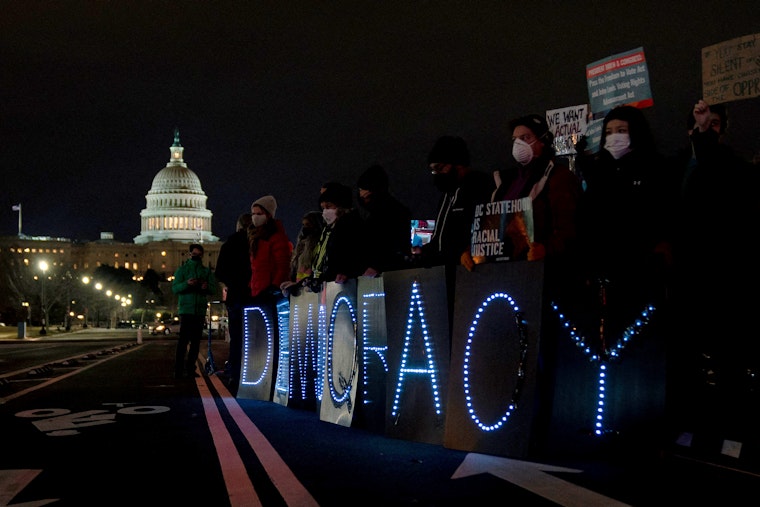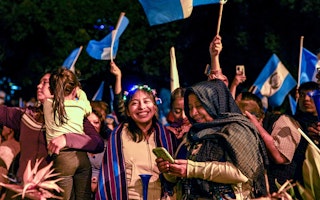Q&A: Tackling Authoritarianism Head-On

Authoritarianism is on the rise, in the U.S. and around the world. What’s causing the erosion of democracy in so many places, and what can be done to help turn the tide? Scot Nakagawa, a veteran progressive advocate, helped found the 22nd Century Initiative as a national hub for groups addressing a core component of authoritarianism—white nationalism—and how to help the U.S. better live up to its democratic ideals.
We spoke to Nakagawa about his path to the Initiative, its goals, and the conference he helped organize this summer to convene and energize pro-democracy activists.
You’ve had a long and varied career as a social justice activist. How did you get started in this work?
I’m originally from Hawaii, and grew up on a sugar plantation. My dad was a construction worker, and my mom was a school clerk. I initially dropped out of high school, but dropped back in with the help of activist teachers and finished the equivalent of high school before taking jobs in adult literacy, and what today we would call helping people out of the school-to-prison pipeline.
I began working on the problem of white nationalism in earnest when I moved to Portland, Oregon after a brutal murder of an Ethiopian immigrant named Mulugeta Seraw in 1988 by a neo-Nazi youth group called East Side White Pride. I ran a monitoring and reporting operation and community organizing campaigns to build opposition to the then fast-growing white nationalist and neo-Nazi factions in the Northwest. Between then and now, I’ve done a lot of things. But I’ve been an anti-authoritarian throughout.
What led you to launch the 22nd Century Initiative?
During the Reagan administration, we began to see the devolving of federal responsibilities to the states, and an unraveling of the safety net. You could see signs of how authoritarians could use democratic means to take power and funders and communities were responding. When the Oklahoma City bombing happened in 1995, white nationalists shot to the top of the FBI watch list, and were forced underground. They were less visible, and it became harder to get people to focus on the problem, to get funding to continue that work.
It took Donald Trump’s campaign to raise the alarm by bringing white nationalists and extreme Christian theocrats out of the shadows and into mainstream politics. I saw an opening to convene leaders to start building a national response from the grassroots up. So did the co-founder of the 22nd Century Initiative, the late, great Urvashi Vaid. Urv and I decided to limit or leave aside other commitments and begin this project a year and a half after Trump was elected president. His breaking of norms exposed the weaknesses of democracy, and the struggle to put together a reasonable resistance.
The concept of liberal democracy has failed us. Democracy is majority rule. Liberalism is about protecting the rights of the minority. Those two strands have not worked together well. So we now have a minority movement of white nationalists reaching for majoritarian power through exclusion and a potential resistance that appears to be rejecting democracy after years of being subjected to the tyranny of majorities. There’s a whole lot of work to do to turn this around.
So how does the Initiative go about trying to roll back the authoritarian tide and bolster democracy?
We’ve assembled a network of some 75 organizations that see building upon the democratic potential of the U.S. as a first principle of civil and human rights advocacy. We want to foster collaboration, create a peer learning environment, and expose groups to subject matter experts who have experience in failed and failing democracies around the world.
How will the conference help the cause?
The conference, which will take place in July in Minneapolis, is an opportunity to help teach one another, build capacity, and plan for what challenges lie ahead. We’re developing an anti-authoritarian playbook to distribute to attendees. And we have people coming from Europe, Myanmar, the Philippines, Thailand, and Malaysia to share their experiences in trying to combat forces that erode democracy in their home countries. We want to build solidarity not just in minds but in hearts as well.
What gives you hope?
Make no mistake, we have our work cut out for us. By some measures more than 70 percent of people around the world live under authoritarian governments. Many are electoral autocracies—there are elections, but they are fixed so that the opposition cannot break one-party rule.
But amid all that backsliding there are inspiring stories of people fighting back. In Thailand, for example, the Future Forward Party was able to make impressive gains against the junta-style government, running a campaign that focused not on past problems but on what the future—a diverse, joyful future—could look like. In the Philippines, activists are developing a timeline for winning a more democratic government, calculating how long it will take for the current regime’s base to age out of power. In Indonesia, a woman was falsely accused of violating election laws as a way of preventing her for running for office. She was able to get a blank box printed on the ballot, and ran a campaign for the empty box that won more votes than the only candidate running for the office.
As people who are concerned about social and economic justice, we’re constantly reacting to changes around the world, lurching from emergency to emergency. In the course of these constantly shifting conditions, we’ve become better at criticism than prophecy. But we have an opportunity for a paradigm shift—to become not just a critical voice speaking out in the fight against authoritarianism, but a prophetic voice, looking to a brighter future. We’re not fighting for the democracy the U.S. has had, but rather the promise of the democratic ideals the nation was founded on—and the chance to make good on that promise for a multiracial tomorrow.
The 22nd Century Initiative is a grantee of the Open Society Foundations.


